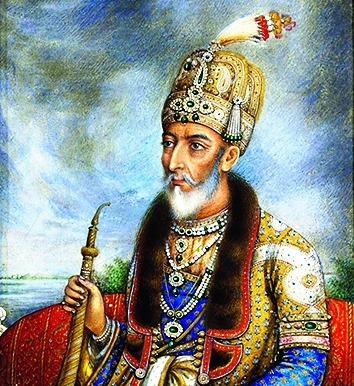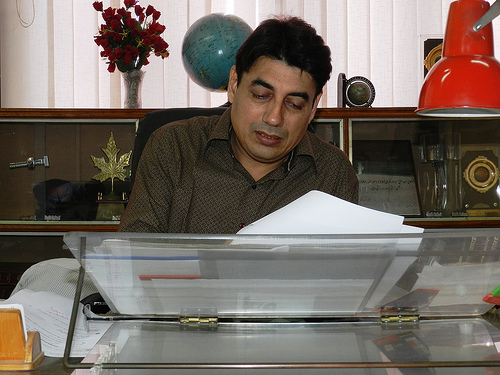NEW DELHI :
THE LIFE & POETRY OF BAHADUR SHAH ZAFAR By Aslam Parvez,
Hay House, Rs 599
This has happened before. When Mahmood Farooqui’s Besieged: Voices from Delhi 1857 was published in 2010, the “voices” of the desperate Dilliwallahs, caught in the throes of a revolt that was not really theirs, sounded strangely familiar. They had been heard in William Dalrymple’s tour de force, The Last Mughal, published four years before Farooqui’s tome came out.
Ather Farouqui’s translation of Aslam Parvez’s seminal work on Bahadur Shah Zafar evokes the same feeling. This is a Zafar we know — a tragic figure undoubtedly, but also one heroic in the midst of adversity, stoic in the face of incomparable loss and grief; a fine poet, humanist and an upholder of the best of the traditions and values that the Mughal court had engendered. Only that Dalrymple’s evocative prose and writing style had done more to popularize the last of the great Mughals than any other piece of work has done for him.
The reason voices and pictures recur is because the works mentioned above conscientiously tapped into long-neglected primary and secondary Persian and Urdu sources that give a very different perspective on Zafar and the Revolt than the conventional viewpoint. Mahmood Farooqui’s research into the Mutiny Papers, written in Shikastah Urdu, threw light on the harrowing experience of the people of Delhi and the personal tragedies that severely dented the picture of the Revolt as a ‘war of independence’. Parvez’s research recovered Zafar’s image and reinstated him as an aesthete, a poet and an iconic figure of the cultural efflorescence that marked the late Mughal era. These independent researches that broke new ground went on to inform, shape and colour Dalrymple’s presentation, which took the story to the large English readership. More than three decades after Parvez had published Zafar’s biography in Urdu, Ather Farouqui’s translation tries to reach the same readership, which, incidentally, heard it all from Dalrymple first.
But Parvez’s treatment of Zafar has a unique flavour. He draws a distinction between Bahadur Shah Zafar the emperor and Zafar the poet. He is unsparing when it comes to the former. Although Parvez acknowledges that the emperor was a victim of his circumstances, reduced to the indignity of having to repeatedly petition the British for his upkeep, the author puts the blame for the last Mughal’s penury on his greed. The ways devised by Zafar’s court to tide over the cash crunch — selling of titles, access to the emperor made easy on payment, his indiscriminate borrowings from the laity — make for incredible reading. What Parvez makes obvious is that even without the Revolt, the British would have made sure that Zafar was the last Mughal to hold fort.
Parvez believes that although Zafar was unwillingly dragged into the war of 1857, once he had committed himself to it, he remained steadfast in his commitment. Dalrymple pictures it differently though. In his narrative, Zafar is withdrawn, confused and often vacillating. But the aspect Dalrymple powerfully highlights in The Last Mughal is one that Parvez repeatedly draws attention to as well — Zafar identifying himself with the suffering of the Dilliwallahs and his powerful determination to retain the secular fabric of Delhi under the severest of pressures, one that led him to ban cow slaughter even on the eve of Eid. In fact, it was to save his beloved city that Zafar took charge of the Mutiny in Delhi.
The other point that Parvez makes is that irrespective of their interests, the British were not completely unresponsive to Zafar’s needs. As proof, he points to his treatment post-Mutiny, particularly that on the way to and in Rangoon. Perhaps Parvez stretches his case a bit. Zafar is known to have been denied even pen and paper in exile. For a poet, this would have meant instant death.
Parvez’s treatment of Zafar as a poet is very different from his treatment of Zafar as an emperor. He makes a strong case for Zafar’s poetic credentials, demolishing Mohammad Husain Azad’s contention that Zafar’s poetry was ghost-written by Mohammad Ibrahim Zauq, who was appointed by Zafar himself to supervise his work. Parvez delves deep into contemporary evidence and compares literary styles to make his case. Whatever Zafar’s failings as a ruler, his calibre as a poet is something Parvez has no doubts about. Acknowledging Zafar’s limitations, Parvez says, “Zafar was like the sinking notes of music while Ghalib was the rising crescendo.”
Ather Farouqui rightly notes the significance of translating Parvez’s work. Given its importance in drawing attention to the “civilizational comingling” of the times that India is now so close to forgetting, he should have been more careful with the work. But he is not. Take his rendition of the poetry, be that of Shah Alam, Zauq or Zafar. Of the many that sound jarring is the following one by Zafar: Tori mariz-e gham ne tere is tarha se jaan/ Ghabra ke ghamgusar sarahne se uth gae (“The way the lovelorn breathed his last/ Startled sympathizers, they jumped their feet with a start”).
source: http://www.telegraphindia.com / The Telegraph,Calcutta,India / Front Page> Opinion> Story / by Chirosree Basu / Friday – June 30th, 2017










